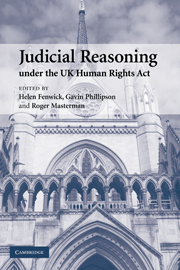Book contents
1 - The Human Rights Act in contemporary context
Published online by Cambridge University Press: 30 October 2009
Summary
Introduction
A number of commentators have pointed out that the inception of Bills of Rights tends to have the effect, as in Canada, of requiring courts to grapple with justifications for rights and freedoms, taking a more philosophical approach to legal reasoning as they attempt to resolve conflicts between individual rights and competing societal and individual interests. When countries adopt a document setting out a list of human rights with special constitutional status (‘a Bill of Rights’), the effect on judicial reasoning tends to be dramatic – as it was in Canada when it adopted the Charter of Rights. In 2000, the Human Rights Act came into force – affording the European Convention on Human Rights further effect in domestic law – and, while it does not have the entrenched status of other Bills of Rights, there is agreement that it does have what ‘constitutional’ status UK law allows.
Academics and lawyers agree that the introduction of the Act was one of the most significant developments in the public law field in the last 100 years. The Act did not create a home-grown Bill of Rights for the UK; instead, it gave further legal effect to the European Convention on Human Rights. Thus, its impact on judicial reasoning was less predictable than was the case in the broadly equivalent situation in Canada.
- Type
- Chapter
- Information
- Judicial Reasoning under the UK Human Rights Act , pp. 1 - 22Publisher: Cambridge University PressPrint publication year: 2007
- 2
- Cited by

